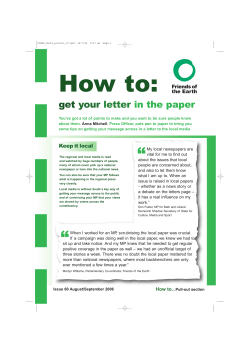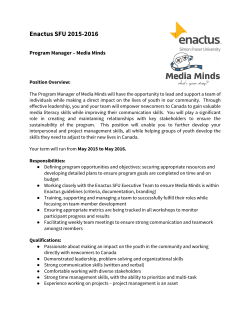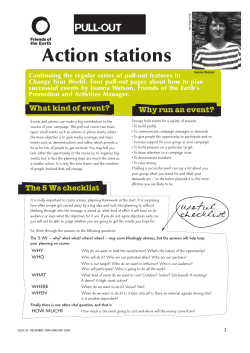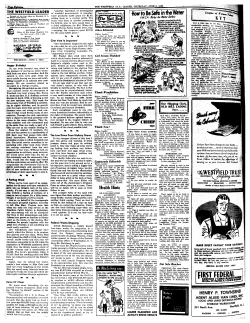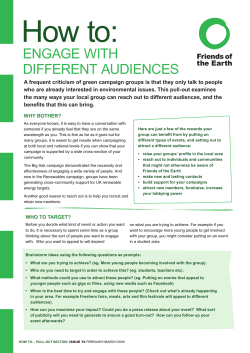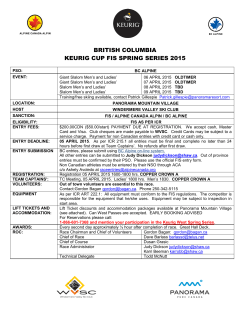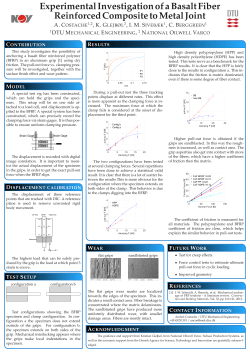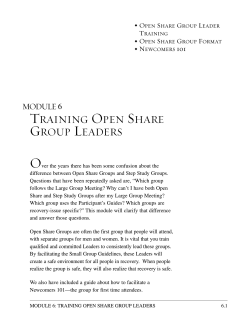
How to:
How to: effectively engage new people What is the secret to transforming newcomers into engaged and active group members? Have you thought about how to welcome and make the most of new people at your next meeting? Network Developer Louise Hazan and Training Coordinator Julian Stanway explain why you might have to and suggest a step-by-step plan to help you prepare. Starting in November and carrying on throughout 2008 we’ll be mailing every supporter on our database to offer them different ways of getting involved in campaigning with Friends of the Earth. One of these options will be to join their nearest local group so we hope you will soon be contacted by some potential new recruits. Are you prepared to make the most out of any keen new people who come your way? Most people are inspired to join a Friends of the Earth group because they want to make a difference, improve their local area, and meet likeminded people. For many, it’s important that the group has a fun, social side to its activities. Others will see joining a group as a way to learn new skills or develop themselves. Ask yourself honestly if your group meets these requirements. There are plenty of simple things you can try to make sure that you do! From an initial enquiry through to following-up on someone’s first visit to your group meeting, here are a few ideas to get you started. Great First Meetings checklist: Plan ahead Meet and greet Have a flexible agenda Collect contact details Introduce people and the group Encourage participation Don’t use jargon Be friendly and positive Build confidence & offer support Have a social event Follow-up Case-study: “I met a new member of Chester local group this week. How did he become a member? He saw the climate change conspiracy programme on Channel 4. It raised some questions, so he emailed Friends of the Earth. He got a good response within hours which he thought was really impressive.The next day, he was walking down his High Street and saw the local group, wearing t-shirts, with a banner and stall, collecting postcards. He approached them and they talked to him about climate change. They gave him a leaflet about the group with details of their next meeting. He turned up, was welcomed and has been coming ever since.” Neil Kingsnorth, Northern Network Developer How to… Pull-out section Issue 67 December 2007/January 2008 First Contact You don’t get a second chance to make a first impression It’s been said that when speaking to someone for the first time it takes 17 seconds for them to form an opinion. Make time to get off to a great start with new people. Whether they’re responding to our supporter mailing or they’ve picked up your recruitment leaflet, the first contact is the key moment. Here’s some tried and tested tips to help transform an inquirer into a new member. Before a simple plan. Who is going to respond to the enquiries? When? How? During lMake l lUsing lUse voicemail & automatic email responses. Make sure they’re clear. Let the enquirer know what to expect and what they should do next. Will you be calling them? When? What can they be doing in the meantime to keep interested? (eg you could refer them to the Community website) Get someone else to listen and test the message or response and tell you how they’d improve it. lAsk the right questions. What do you need to know from that first contact? Finding out why someone is interested in getting involved with the group makes it easier to match their interests with those of the group, and will demonstrate to the inquirer that their interests & opinions matter and are valued. What’s their name and where are they based? What are their contact details? l ecide what you’re going to D tell them. Write a checklist of the information that enquirers need to have after they first contact you. Offer to send them some further information about the group including recent achievements and how these have benefited the community. After etting back. Try to respond G promptly to enquiries. Be friendly and informative. l ow did it go? Take a few H minutes to reflect on how the conversation went… What went well? Did you forget anything? What could be improved for the next ‘phone call? l ction points. Do you need to A make a note of the chat? Is there anyone else that you need to inform about it (eg meeter and greeter for your next meeting). Did you promise to send the enquirer further details or a newsletter? names. This will help build a more personal connection. lAsk questions and listen. Ask about their interests and refer back to them so they know you’ve been listening. Avoid long speeches or lectures. lBe clear. Try to avoid jargon & acronyms. Allow time for questions. lBe honest. Emphasise what people can get out of being in a group, but don’t promise the Earth or you’ll struggle to deliver it. Offer details of other organisations if they are more relevant to the enquirers’ interests. lBe positive. You are more likely to get a positive response if you have a positive tone. Tell people about what went well rather than dwelling on the negatives. lGet them involved. Invite people to your next meeting, stall or action. Perhaps ask them to come 15 minutes early for an introduction to the group. Let them know who will be there to greet them. How to… Pull-out section Issue 67 December 2007/January 2008 First meetings Be prepared, friendly and flexible If a newcomer makes it to your meeting, their decision about whether or not to join the group will be based on their experiences there. Everything will count from the conversations they have, the way the meeting is run, to what the group is currently working on. Before If your recruitment strategy or our supporter mailing is working and your first contact is successful, you could get newcomers every month so it’s well worth being prepared to include them in your meeting. Appointing a meeter-greeter is a great way to ensure that newcomers will feel welcome from the beginning and are up to speed with the way your group and meetings work. Alternatively, an experienced group member could take new people aside for the start of the meeting whilst the regular group business goes on with those who need to be involved. This is a good time to give the newcomer a welcome pack or show them a scrapbook with cuttings of recent media stories and actions you’ve taken. During A well-facilitated and productive meeting is the key to engaging newcomers. Have a clear agenda on display (see model agenda overleaf). Good facilitation or chairing will help keep you to time, keep discussions focussed and engage everyone in the room. Explain acronyms to newcomers and make sure they are up to speed with the topic of each discussion or the facilitator could introduce each item briefly beforehand. It’s important to invite new members to contribute their thoughts and ideas, without putting pressure on them to speak. Splitting into smaller working groups for different campaigns often helps shy people feel more comfortable in making contributions and feeding their ideas into the whole group. After After the meeting, remember to check how people found it and answer any questions newcomers might have. Is there anything in particular they want to know more about or get involved with? New people may want to volunteer to take on something straight forward, but don’t try to rush people into taking on your vacant group positions. Working jointly with an experienced campaigner enables new members to learn about subjects and develop their skills, so offer support and resources. Some groups have social time after meetings (eg in a local pub), which gives new people the chance to get to know members in a more informal setting. Make sure you invite everyone at the end of the meeting and use the opportunity to find out more about the new people. If you haven’t already, get contact details so you can send them action points from the meeting and keep in touch about upcoming events. A couple of weeks after the meeting, phone the newcomer and ask they are interested in joining the group and becoming active. How to… Pull-out section Issue 67 December 2007/January 2008 Model agenda When What Case study: 7.30pm Intr oductions Display agen da. Ask ever yo ne to say who they are and one thing abou t what they do the group, why in they came or what they wan from the mee t ting (five minut es maximum). 7.35pm Wh at we’ve b een doing? W hat has happ ened since th e last meeting? Review any ac tions /events th at happened. Bring out wha t worked well and what coul have gone be d tter. Record ke y points for next time and celebrate succ esses. 7.50pm Wh at’s c oming up? W hat opportuniti es are coming up this month, what is happening na tio na lly / locally? How does this af fe ct ou r campaign priorities/even ts /actions? W hi ch do we follow up in m ore detail afte r the break? 8.00pm Bre ak C hat to new pe ople, have refr eshments, read Change Your World, lo ok at group scrapbook or recent press cuttings, etc. 8.10pm Wh at are we doin W g next? ork on key campa ign areas (eg climate change) in sm all groups to pl an fu ture actions or deal with is sues arising. Work up an idea to take fo rward, brains torm ideas fo action, assign r tasks and writ e up actions. 8.35pm Rep ort b ack E ach working gr oup reports ba ck on ideas and actions fo r 5 minutes an d group decide what to do, w s ho will do wha t, by when. 8.50pm Acti on Slot E veryone given one action to do at meeting (eg an action from current C ha nge Your World or mak ing a banner) or at home (eg ask family to sign Big Ask postcards) 8.55pm Any other busine ss and round up 9.00pm Soc ial/drink Birmingham Friends of the Earth has developed a way of involving new members which keeps them coming back. Their designated meeter-greeter Alison introduces newcomers to everyone and answers any questions they have. She gives out welcome packs with info about current campaigns, who does what and how to join the group. The group also include a 5 minute slot on the agenda to find out what people are interested in and why they’ve come. Alison: “I get there early to meet new people and usually spend 20 minutes either before or after the meeting telling them how everything works. We always have so much to get through on our agenda that it can be quite overwhelming for new people. This system helps us get on with group business efficiently but also means new people know what’s going on and can get involved straight away.” Links and Resources: For more tips see the new Local Groups Handbook http://community.foe. co.uk/handbook/. Profile Pack – publicity materials and welcome packs: http://community.foe.co.uk/ local_groups/running_your_own/ resource/publicity/resources.html. Other How To Pull-outs: eg. Running Better Meetings http://community.foe.co.uk/ resource/how_tos/. How to… Pull-out section Issue 67 December 2007/January 2008
© Copyright 2025

